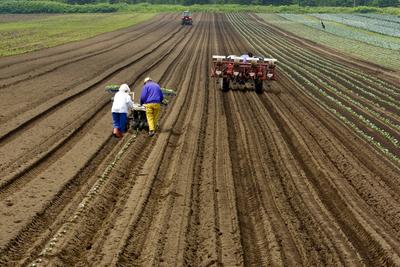In opposition, the DPJ undermined the limited structural reforms in the agriculture sector that the LDP-MAFF were trying to implement, including farmland reform to facilitate the entry of private sector businesses into agriculture. In its 2009 election manifesto, the DPJ was explicit in its commitment to supporting small farmers with some DPJ politicians declaring that ‘small farms play a role in supplying food and in preserving the environment so there is no need for policies that provide incentives to farmers to expand their production scale’.
In the future, the DPJ will continue to court the farm vote. Statistics for the DPJ’s Lower House (LH) election performance in 2009 reveal that the DPJ has replaced the LDP as the predominant party in rural and semi-rural single-member districts (SMDs). It won more than half the total number of semi-rural and rural SMDs in this election (65 out of a total of 120). However, these districts are still highly contestable, especially rural seats where the LDP and DPJ won the same number each (27), so strong policy competition between the LDP and DPJ will continue over matters affecting the agricultural electorate.
The DPJ has always been internally divided on the issue of agricultural trade liberalisation. Some DPJ Diet members argue that the compensation program will cancel out the effects of drastic tariff reduction on farmers. Others are fundamentally opposed to tariff reductions on farm products as endangering domestic agriculture. The 65 DPJ Lower House members representing rural and semi-rural SMDs make up 29 per cent of the total DPJ SMD membership, but that means 71 per cent represent semi-urban, urban and metropolitan seats. The fact remains that the DPJ has been and remains mainly an urban party. The more urbanised the electorate, the better the DPJ performs. Although the DPJ will continue to pursue the farm vote in elections, it is certainly a more urban-orientated party than the LDP whose seat dependencies are a mirror-image of the DPJ’s in terms of the rural/urban ratio.
In the major battles to date between the DPJ and the forces opposing agricultural market opening, the latter have scored some modest victories. Firstly, the wording on the US-Japan FTA in the DPJ’s 2009 manifesto was changed to accommodate agricultural sensitivities. On this issue it was Prime Minister Kan and former Prime Minister Hatoyama Yukio who capitulated to agricultural interests. Kan said at the time: ‘We will give clear consideration to agriculture, and the brakes have just been applied to the liberalisation of trade in agricultural products’. So Kan is on record as not supporting agricultural trade liberalisation.
Secondly, the Kan administration’s ‘Basic Policy on Comprehensive Economic Partnerships’ of 9th November 2010, while strongly supportive of Japan’s pursuing EPA initiatives, watered down the phrases referring to the TPP. What was initially a reference to the government acting ‘with the aim of participating in negotiations’ was removed and replaced with a somewhat equivocal commitment to just ‘collecting information’ and ‘commencing consultations with TPP countries’.
These ready back-downs on Kan’s part suggest that he does not have the kind of sustained policy conviction about agricultural trade reform needed to guide him and his administration through the TPP negotiations.
It is one thing for his party to be divided but Kan also faces a divided cabinet. Kan’s decision to appoint as his first MAFF Minister, Yamada Masahiko, a former member of the Liberal Party who is very close to Ozawa, is evidence that he made some very bad selections to executive positions if promoting agricultural market opening was a real priority. Yamada now leads the ‘National Council to Study the TPP’ which holds public gatherings in regional areas to drum up resistance to the government’s TPP plan and is actively undercutting the government’s ‘Open Japan Forums’ which are aimed at selling the TPP idea to the public.
Additionally, Kan did not appoint the kind of executive team of convinced economic reformers that might have helped him deliver a breakthrough. In particular, Kan’s first Minister of Economy, Trade and Industry, Ōhata Akihiro, was opposed to the TPP and agricultural reform while most of the other ministers equivocate. In late February National Strategy Minister Gemba Kōichirō said that the government would press ahead with bilateral trade agreements because exemptions were easier, instead of taking part in the TPP. Gemba initially advocated signing EPAs first, then the TPP. Moreover, the current Minister of Economy, Trade and Industry, Kaieda Banri, who was previously pushing the TPP idea strongly, more recently handed over the issue of Japan’s participation to the MAFF, saying that if the TPP does not serve the national interest, the government could opt for ‘an honourable retreat’.
In summary, the DPJ is too internally-divided, too chaotic, and too lacking in skilful and committed political leaders to deliver on agricultural structural reform and agricultural trade reform. And now Japan has suffered the triple disaster of the earthquake, tsunami and nuclear meltdown, the fiscal burden of which will endanger the income support program itself and all of which are likely to set back the cause of agricultural trade liberalisation. Trade policy as a whole will be put in the non-urgent category by a government overwhelmed by serious, immediate problems of crisis management, followed by a myriad of decisions that have to be taken on reconstruction and how to fund it.
Aurelia George Mulgan is Professor of Politics at the University of New South Wales, Australian Defence Force Academy.
A longer version of this essay will appear in Japanese Studies Online.

